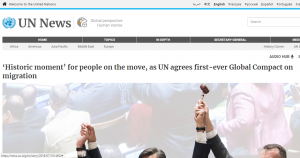
(Harvard University, one of the most well known U.S. schools)
The full text for UN Global Migration Compact is RIGHT HERE.
Please sign this: PETITION E-1906 CLICK HERE
A lawsuit continues today against Harvard University filed by several Asian students. They allege that Harvard has “racial quotas” to fill, and that Asian students, despite on average having higher academic accomplishment, are not getting offers of admission at the rates they should.
The suit alleges that only about 20% of offers of admission — in continuous years — go to Asian students, even though their population is applying in even higher proportional rates, and that they are on average more accomplished.
Let’s make an important distinction of equality.
(1) Equality of opportunity: Everyone is treated the same. Everyone has the same chances to rise or fall based on their own actions. This creates a merit based society, as is explained here.
(2) Equality of outcome: Different rules are used to ensure certain results are obtained. If 50% of the general population are women, then 50% of the group will be women. If 35%, 25%, and 10% percent of the population are races A, B, C, then the racial makeup of the group will be 35%, 25%, and 10%. This completely undermines a meritocracy, as double standards will almost always have to be used.
The Washington Post linked a transcript in one of its articles. It is worth a read. Although that is appreciated, there were a few commenters in the article that merit listing.
There was Sarah F. Cole, and African American who graduated in 2016, who said: “Race-blind admissions is an act of erasure. To not see my race is to not see me.”
and this one ….
“Tang Diep, a Vietnamese immigrant who is currently a senior, said: “I personally, really believe that I benefited from affirmative action. Like in allowing the admissions process to take into account my race and ethnicity, it allows my immigration history to be taken into account. It allows my own experiences of overcoming the — my racial identity when I was younger and understanding that to really be portrayed….
That is right. These people are actually defending race-based discrimination. Rather, they seem to completely miss the point, while this man didn’t. Disregarding a person’s race for college admissions or job offers is not “erasing” them. Rather, it is treating them equally and fairly.
The EQUAL PROTECTION CLAUSE of the 14th Amendment reads as follows:
All persons born or naturalized in the United States, and subject to the jurisdiction thereof, are citizens of the United States and of the state wherein they reside. No state shall make or enforce any law which shall abridge the privileges or immunities of citizens of the United States; nor shall any state deprive any person of life, liberty, or property without due process of law, nor deny to any person within its jurisdiction the equal protection of the laws.
It will be interesting to see how this plays out. The U.S. Supreme Court has already made some rulings on the issue of affirmative action. For example:
Regents of the University of California v. Bakke, 438 U.S. 265 (1978) ruled that affirmative action was legal, but that setting aside a certain number of spots for a specific group was illegal. Actually, this seems to be what Harvard was (allegedy) doing.
Grutter v. Bollinger, 539 U.S. 306 (2003) ruled that the University of Michigan Law School could have affirmative action in order to bolster underrepresented groups, but like with Bakke, specific quotas could not be set.
The Supreme Court has ruled that affirmative action was okay within the parameters of merit, in essence. So equality of outcome is okay, as long as it is done within equality of opportunity. Oh, the mental gymnastics of the Supreme Court Justices.
Race and IQ has long been a contentious topic for debate. So has the topic of race and academic accomplishment. Here is one such finding. And a quick online search will find many studies done which contrast IQ and race.
One development worth watching is the U.S. President Donald Trump is encouraging colleges to stop the practice of affirmative action, and to steer more towards a racially-blind admissions process.
Of course, there is a Canadian perspective of the issue to be shown here. (This is CanuckLaw after all). Affirmative Action is directly mentioned in Section 15(2) of the Canadian Charter of Rights and Freedoms.
>Equality Rights
Marginal note:
Equality before and under law and equal protection and benefit of law
15. (1) Every individual is equal before and under the law and has the right to the equal protection and equal benefit of the law without discrimination and, in particular, without discrimination based on race, national or ethnic origin, colour, religion, sex, age or mental or physical disability.
Marginal note:
Affirmative action programs
(2) Subsection (1) does not preclude any law, program or activity that has as its object the amelioration of conditions of disadvantaged individuals or groups including those that are disadvantaged because of race, national or ethnic origin, colour, religion, sex, age or mental or physical disability.
In fact, there is an inherent contradiction within the Canadian Charter itself. 15(1) promotes equality of opportunity, while 15(2) promotes equality of outcome.
Canadian National Railway Co.v. Canada (Human Rights Comm.) and Action travail des femmes (1987), 8 C.H.R.R. D/4210 (S.C.C.) was one such case in Canada, where the Canadian National Railway was ordered to have 1 of every 4 new hires to be women. The Supreme Court of Canada noted that 0.7% were female, and enforced the original Human Rights Tribunal order.
The fact that women were, on average, much less inclined to seek heavy manual labour was irrelevant. The vast discrepancy “had” to be because of systemic bias.
In summary, affirmative action (whether it is racial, gender, or otherwise) should not be a part of society. In a “merit-based” society, people succeed on their positive merits: education, experience, attitude, work ethic, qualifications, etc…. Further, people should fail based on negative traits: lack of experience, lack of education, poor attitude, etc….
As was outlined earlier in the article, there is a huge difference between (1) Equality of Opportunity; and of (2) Equality of Outcome. The former promotes the idea that hard work drives success, while the latter argues all of that should be negated in favour of a “politically correct” group that reflects the general population. These 2 ideas cannot co-exist, as they are contrary to each other.
It will be interesting to see how the U.S. case plays out. The U.S. Supreme Court has (for now) been willing to allow affirmative action to take place in higher education, provided no specific quotas were used. This appears to violate that exception, but we will have to see.
Final thought: A workforce or a college class should comprise a group that works hard. It should not look like a random sample of society …. just because it’s 2015, or some such nonsense.






